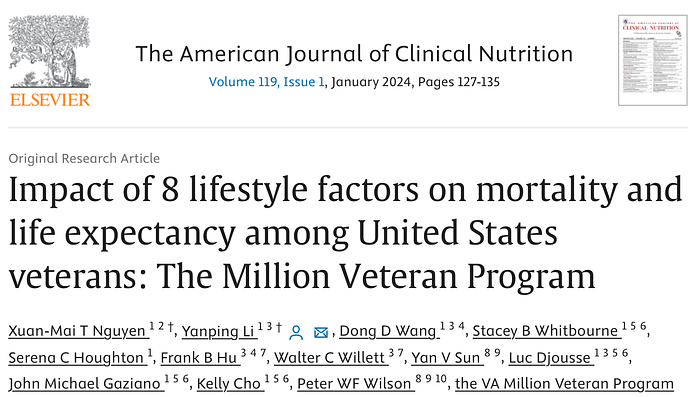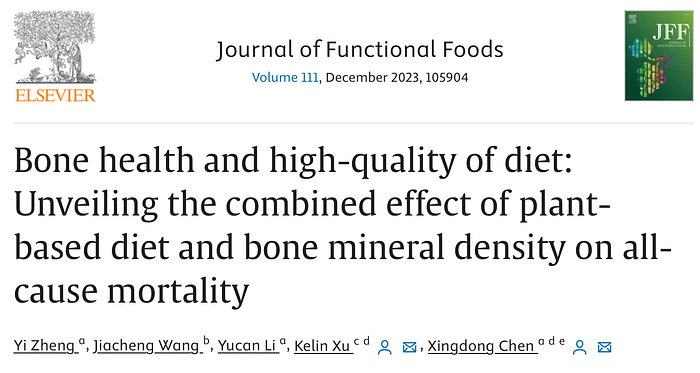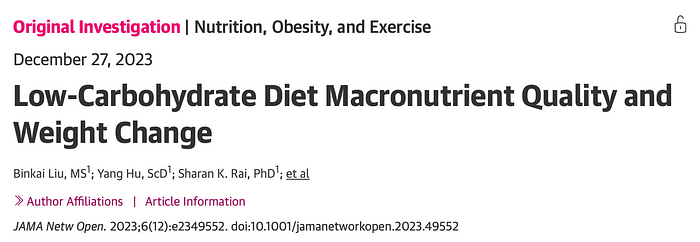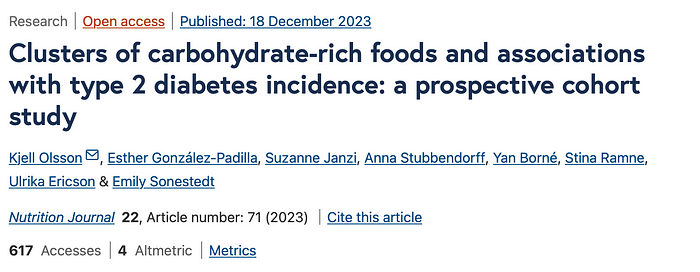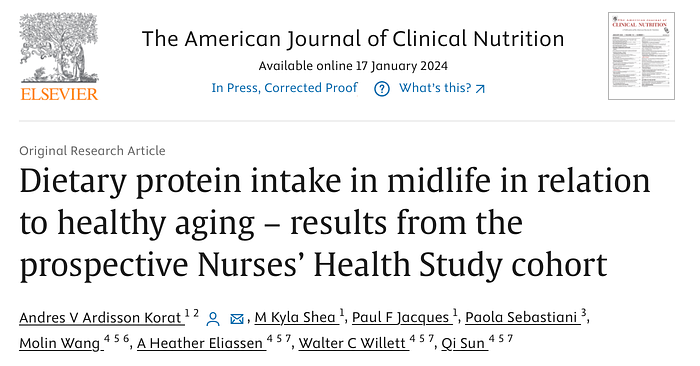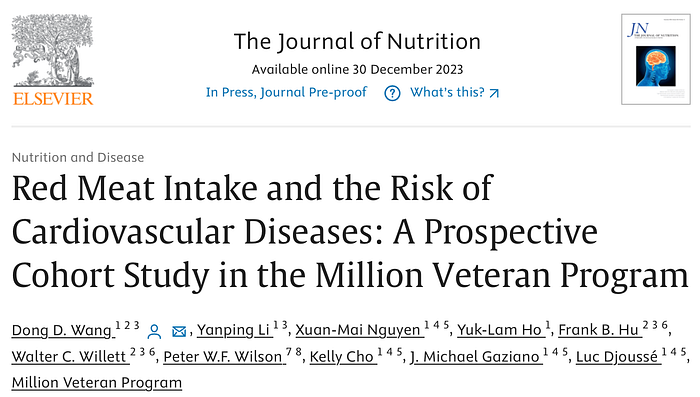Review of the plant-based lifestyle medicine news January 2024
This year we broaden our focus to include all six pillars of lifestyle medicine, alongside plant-based nutrition. I have changed the name of my blog and will increasingly include relevant lifestyle medicine articles.

BEST DIETS OF 2024: The year always begins with a review of popular diet patterns by the US News and World Report. An expert panel rates each diet based on ‘nutritional completeness, health risks and benefits, long-term sustainability and evidence-based effectiveness’. This year, 30 diets were rated, and all top-rated diet patterns emphasised whole plant foods. For the 7th year in a row, the Mediterranean diet pattern came out top for overall best diet. The Ornish diet, which is a low-fat whole food plant-based diet, came third for heart health (having previously been the top heart healthy diet in 2022). The vegan diet ranked 10th overall, losing points for being more difficult to follow and at risk of nutrient deficiencies. Of course those of us that follow a vegan, or 100% plant-based diet would disagree with these criticisms, but it does reflect mainstream perception. Of note, Drs Neal Barnard and Michael Greger along with Dr David Katz were part of the expert panel. Interestingly, the low-carb and Paleo type diets rank 20 and below.
You can read more about the Mediterranean diet and comparisons with a vegan diet from this excerpt from my book Eating Plant-based, co-authored with my sister Zahra.
INCREASING LIFESPAN USING LIFESTYLE MEDICINE: As we broaden our organisational mission to incorporate more lifestyle medicine approaches, this new paper shines a light on the huge power of healthy habits. For anyone new to the speciality of lifestyle medicine, this up to date review by some of the greats in the field is well worth reading.
The study highlighted included 276,132 veterans (mostly male) in the Million veteran program, aged 40–99 years at recruitment, which took place between 2011–2019. Data on 8 healthy lifestyle factors were available at baseline. 1) Whole-food, plant-predominant eating pattern assessed using the healthful plant-based diet index, never smoking, never drinking or typically no more than 4 drinks in a day, avoiding other risky substances particularly opioids, restorative sleep (7–9hrs per day), managing stress (using health questionnaire), meeting physical activity guidelines and social connections.
During the follow up period, 34,247 deaths were recorded. The analysis showed that each healthy habit was associated with a significant reduction in premature mortality, ranging from 5–56% risk reduction. Lifestyle factors were responsible for 64% of the risk of dying, with the greatest negative impact coming from physical inactivity, ever smoking, and an eating pattern not consistent with whole-foods or primarily plant-based.
At the age of 40, participants with 8 healthy lifestyle factors had a life expectancy of 47 years. In contrast, those with no healthy habits only lived another 25 years. This benefit held true even after adjusting for social determinants of health. Thus, healthy habits added more than 20 years extra to life expectancy! Prior studies have shown these extra years are usually lived in good or better health.
PLANT-BASED DIETS AND RISK OF COVID-19: Over the last 4 years we have had numerous studies demonstrating that diet and lifestyle factors are associated with outcomes following infection by SARS-CoV-2. Plant-based diets in particular have been highlighted as being beneficial for improving outcomes from COVID-19, likely due to the the anti-inflammatory effects, benefits to the health of the gut microbiome and the association with improved cardiometabolic health. During the height of the pandemic, I wrote a number of articles highlighting the positive impact of healthy lifestyle habits, the last written in Sept 2022.
This new paper from Brazil highlights the potential for vegetarian and vegan diets to reduce the risk of getting COVID-19 infection. The study compared people who self-reported following an omnivorous diet with those on a plant-based diet, which included flexitarians (meat consumed ≤3 times a week), vegetarians and vegans. The plant-based group was then further broken down into a vegetarian group that including lacto-ovo vegetarians and vegans (meat-free diets). Participants were recruited between March and July 2022 and followed for a minimum of 6 months.
702 participants were included, 424 omnivorous and 278 plant-based (191 vegetarians and 87 flexitarians). As expected, the plant-based group had higher intakes of vegetables, legumes and nuts, and lower intakes of dairy and meats. After adjusting for potential confounding factors such as sex, ethnicity, lifestyle factors and chronic conditions, the analysis showed that people reporting to be on a plant-based diet had a 39% lower chance of getting COVID-19 infection, with most of this benefit coming from the vegetarian group (both veggie and vegan). There was no association with severity of infection.
Of course, this type of observational data has a number of limitations and does not demonstrate a causal relationship between consuming a plant-based diet and COVID-19 infection. However, it does add to the growing body of evidence that dietary factors are important when it comes to incidence and severity of infections. Data from the Zoe COVID-19 study showed a similar impact of consuming a healthy plant-based diet with a greater benefit for reducing severity (by up to 40%) rather than incidence. We don’t really need more reasons to adopt a plant-based diet, but if less COVID-19 is a side-effect, then all well and good.
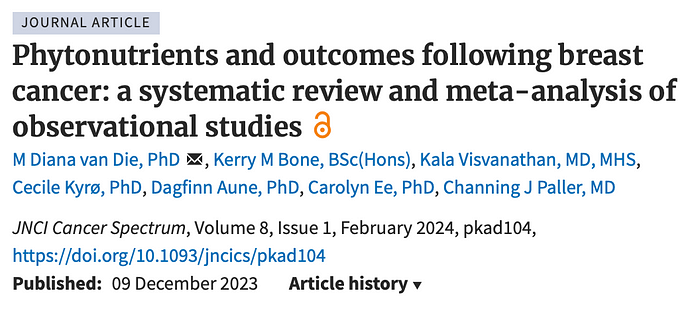
PHYTONUTRIENTS AND BREAST CANCER: I have a particular interest in diet and cancer outcomes. Most of the available dietary data relates to the common cancers, colorectal, breast and prostate cancers and tends to focus on prevention. It is hugely useful to have studies assessing the impact of diet and nutrition for people living with and beyond a diagnosis of cancer.
This new meta-analysis beings together data from 32 observational studies with the aim of establishing the role of specific plant foods and their phytonutrients on breast cancer recurrence, breast cancer–specific mortality, and all-cause mortality, with a focus on the most effective dosage and time frame for consuming these exposures. The foods and nutrients analysed were soyabeans, lignans, cruciferous vegetables, green tea and their phytonutrients.
The results showed that higher intakes of soya isoflavones were associated with a 26% reduction in risk of breast cancer recurrence particularly among postmenopausal and oestrogen receptor–positive survivors, with the greatest risk reduction at 60mg/ day and no further reduction at higher doses. This finding is consistent with intakes of 2 to 3 servings (50–75mg isoflavones) per day. Soya isoflavones were also associated with a 12% reduction in risk of all-cause mortality with the greatest reductions at 20 to 40mg/day (0.8–1.6 servings/ day). Soya products were also associated with a significant reduction in breast cancer recurrence. An important finding is that the benefits of soya consumption extend to both users and non-users of Tamoxifen. Of note, one serving (25mg isoflavones) can be provided by 250mL soya milk, 85 to 100g tofu, or 85g cooked soybeans.
Higher blood concentrations of enterolactone (a gut microbiota metabolite of dietary lignans found in plant foods) were associated with a roughly 30% reduction in risk of breast cancer-specific mortality and all-cause mortality. However, dietary lignans were not associated with outcomes, suggesting that gut bacteria are integral to the response to lignans. Intake of green tea was associated with a borderline significant 26% reduction in risk of recurrence with intakes of around 5 cups per day. No association was observed for intakes of cruciferous vegetables.
Overall, it is clear that nutrients within plant foods are bioactive and can improve cancer outcomes. However, focussing on overall diet quality is the current best approach. The researchers call for more robust studies with more consistent reporting of dose, timing of intake in relation of cancer diagnosis and consistent use of terminology for reporting end points.
PLANT-BASED DIETS AND BONE HEALTH: This is a useful addition to the literature on plant-based diets and bone health. I have previously reviewed the available data in this article, which summarises concerns around bone health for those following vegan and vegetarian diets.
This new analysis aimed to assess the impact of plant-based diet quality using the plant-based dietary index, which groups dietary data into a healthy and unhealthy plant-based diet score. The study used data from the National Health and Nutrition Examination Survey (NHANES), which is a continuous cross-sectional survey conducted by the Centers for Disease Control and Prevention with the aim of evaluating the health and nutritional status of individuals in the United States. It included 16,065 participants and categorised participants based on bone mineral density (BMD) measurements into normal BMD, osteopenia, and osteoporosis. The association between plant-based diet indexes, different BMD status and mortality was assessed.
The results showed that lower BMD was associated with a higher risk of all-cause mortality. However, a healthy plant-based diet was associated with a significantly lower risk of mortality and was able to compensate for the negative impact of lower BMD on all-cause mortality. The opposite was true for an unhealthy plant-based diet. Interestingly, individuals with osteoporosis consuming an unhealthy plant-based diet had a higher risk of all-cause mortality, but this association was not observed in the population with normal BMD. Therefore, diet quality may be even more important in people with osteoporosis.
When analysing specific foods, those with higher intakes of vegetables resulted in a reduced risk of mortality, whereas higher intakes of fruit juice, sugar, animal fats, and eggs associated with a higher risk of death.
LOW-CARB DIETS AND WEIGHT MANAGEMENT: Low-carb diets continue to be promoted within nutrition circles and there can be some short-term benefits including weight loss and better glucose control. However, concerns arise when healthy carbohydrates from whole foods are replaced by animal sources of protein and fat, which have an adverse impact on long-term health.
This is a useful study addressing diet quality on a low-carb diet and the impact on weight change. 123, 332 participants from the Nurses’ Health Study and Health Professionals follow-up study were included and followed for over 30 years. Based on repeat diet assessments every 4 years, carbohydrate intakes ranged from 40 to 57% of energy. In general, body weight increased over time. Animal-based low-carb diets resulted in greater weight gain over time when compared to low-carb diets with higher intakes of plant protein and unsaturated fats, which were associated with less weight gain. Once again, the data emphasises the important of diet quality over and above macronutrient proportions.
One major concern about an animal-based low-carb diet is that it tends to be high in saturated fat resulting in elevated LDL-cholesterol levels. This new and interesting meta-analysis finds that elevated LDL-cholesterol mainly occurs in people with the normal BMI range but not in people with a higher BMI.
CARB-RICH FOODS AND DIABETES: There is an often fear around the consumption of fruit due to the high sugar content, especially when it comes to diabetes prevention and management. Yet, over and over, fruit consumption has been associated with better health outcomes. This new study confirms the benefits of fruit consumption, even for type 2 diabetes.
The study included 26, 622 participants from a Swedish prospective cohort. Dietary data were grouped into five clusters: high vegetables/low added sugar, high sugar-sweetened beverages, high juice, high fruit, and high refined carbohydrates/low fruit & vegetables (51% of participants = reference diet). During the 18 years of follow-up, there were 4046 cases of diabetes. The high fruit group had a 14% reduction in risk of type 2 diabetes compared to the reference group. This high fruit group were consuming 171g of fruit per 1000kcal, which equates to around 4–5 portions a day. No other diet cluster demonstrated an association with diabetes risk.
These data confirm results from other studies demonstrating that consumption of fruit, along with other carbohydrate-rich plant foods, is associated with a lower risk of type 2 diabetes. This is in part due to the association with lower body weight. However, a recent study analysing data from the UK biobank study showed that healthy plant-based diets significantly reduced risk of type 2 diabetes (24% lower risk) but lower body weight only partially explained these results. Mechanisms at play are likely to include lower levels of inflammation and a healthier gut microbiome. In this study, vegetables, tea and coffee were key mediators of the association.
DIETARY PROTEIN AND HEALTHY AGEING: The optimal intake of protein for healthy ageing continues to be a topic of debate. In general, there seems to be a consensus that higher intakes in older adults is associated with better health outcomes. This new analysis from the Nurses’ Health Study examines the impact of protein intake on healthy ageing as defined as having no impairment of memory or physical function, good mental health and being free from 11 major chronic conditions, including cancer (except for non-melanoma skin cancer), type 2 diabetes, myocardial infarction, coronary artery bypass graft surgery or percutaneous transluminal coronary angioplasty, congestive heart failure, stroke, kidney failure, chronic obstructive pulmonary disease, Parkinson disease, multiple sclerosis, and amyotrophic lateral sclerosis.
The study included 48,762 women who were under the age of 60 years in 1984 and followed until 2016. The analysis assessed healthy ageing between 70–92 years. The results showed that higher intakes of protein were associated with greater odds of healthy ageing. All sources of protein showed this beneficial association. However, when broken down into animal, dairy and plant sources of protein, it was plant protein that was associated with the greatest benefit to both physical and mental health. In substitutions analysis, replacing 3% of calories from saturated (SFA), monounsaturated (MUFA) or polyunsaturated fat (PUFA), or carbohydrates from whole grains or refined sources, with plant protein was associated with a 22% to 58% greater chance of healthy ageing. Replacing animal protein or dairy protein with plant protein was associated with a 38% and 26% greater chance of healthy ageing respectively. In the substitution analyses, researchers observed that animal protein intake was unfavourably associated with the incidence of chronic diseases when compared with calories primarily from carbohydrates (total, refined, or whole grain) or from total fat, SFA, MUFA, or PUFA.
In terms of the amounts of protein being consumed, those in the lowest quintile were consuming 14.2% (57.7g) of energy from protein compared to the highest quintile of intake at 22.5% (89.2g/day). Potential mechanisms proposed by the researchers that may explain these results include that dietary protein (and exercise) activates the mammalian target of rapamycin complex 1 signalling, thereby stimulating muscle protein synthesis, which is associated with improved physical function in older adults. Plant sources of protein come in a healthier package than animal sources and are associated with better cardiometabolic health and lower levels of inflammation.
Overall, this study confirms the results of several others, that higher protein intakes in later life may support better health and longevity with plant sources of protein being superior to animal sources.
Despite the rather puzzling anti-vegan headlines in the Daily Mail, this study did not include vegans and therefore results cannot be used to make conclusions about health outcomes on a vegan diet. It may be that if all protein consumed comes from plants and intakes are optimised at these higher levels of intake, vegan health outcomes may be superior to those following an omnivorous diet. We just don’t know.
RED MEAT, CARDIOVASCULAR DISEASE AND CANCER: More data supporting the elimination of red meat from the diet. The study analysed data from the Million veteran program and included 148,506 participants, mainly men, followed for 3.8 years. Higher intake of total red meat, unprocessed red meat and processed red meat was associated with 18%, 14%, and 29% increased risks of cardiovascular disease, respectively. There was a dose effect with around a 10% increased risk for every 1 serving per day. For fatal CVD, there was a 31% and 59% increase in risk for people consuming the most (>2 servings per day) total and unprocessed red meat compared to those consuming the least (<0.14 servings per day). Processed red meat consumption had a greater negative impact on non-fatal CVD (48% increase in risk). These associations were stronger in African American than in white participants. Replacing 0.5 serving/day of red meat with 0.5 servings/day of nuts, whole grains, and skimmed milk was associated with 14%, 7% and 4% lower risks of CVD, respectively. Overall, the analysis showed that 7.7% of CVD events in this study population could have been potentially prevented if all the participants reduced their red meat consumption to fewer than half a serving per day.
We have also known for a while that red and processed meat consumption increases the risk of colorectal cancer. This new paper analysed data from 5 Finish cohorts and included 43,788 participants. The researchers showed that substitution of just 100g of red meat and 50g of processed meat with equivalent amounts of plant foods would reduce the risk of colorectal cancer. Small swaps are still worth the effort.
If the negative health impacts were not enough, then the negative impact of producing red meat on planetary health may convince you. The 2023 Lancet countdown report finds that that production of red meat (and dairy) contributes 57% of agricultural emissions whilst being responsible for 16% of all diet-related deaths (1·9 million). In the UK, the agriculture sector contributed almost 45% of the UK’s greenhouse gas emissions in 2020, with red meat and dairy accounting for 74% of all emissions related to the local production of agricultural products and 70% of all emissions related to the consumption of agricultural products (either locally produced or imported). In addition, in 2020, 42,000 deaths in the UK were associated with excessive consumption of dairy, red meat and processed meat and 70,000 deaths were associated with insufficient intake of nutritious plant-based foods such as fruits, vegetables, legumes, whole grains, nuts and seeds.
Please follow my organisation ‘plant-based health professionals UK’ on Instagram @plantbasedhealthprofessionals and facebook. You can support our work by joining as a member or making a donation via the website.

